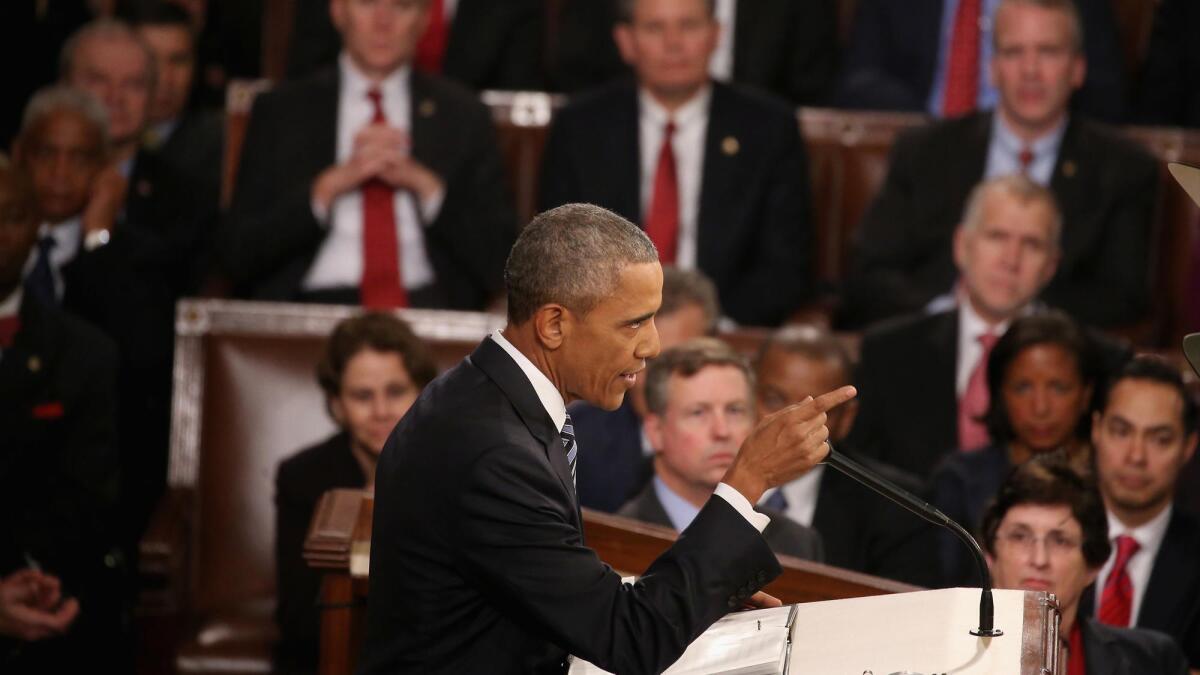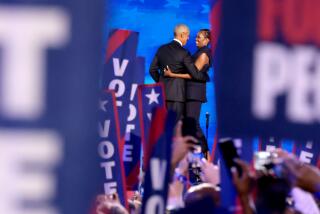Obama envisioned a bridge across party lines. Instead he oversaw a deepening chasm

- Share via
Reporting from Washington — He first achieved national renown with a speech hailing bipartisanship, and spent much of his presidency singing the praises of cooperation across party lines.
But nearly all of his major accomplishments resulted from party-line votes or executive actions.
For the record:
10:41 p.m. Jan. 23, 2025An earlier version of this article said Republicans gained control of both houses of Congress in the midterm election of 2010. Republicans gained control of the House of Representatives that year; they gained control of the Senate in the 2014 midterm. The article also referred to Sen. Charles Grassley as a committee chair in 2010; he was the senior Republican member on the panel.
And if Republicans accused him of paying too much attention to Democratic interests, allies blamed him for neglecting his party. Democrats lost a dozen governorships and hundreds of state legislative seats, as well as control of Congress, during his tenure.
President Obama leaves office with job approval ratings comparable to the high final marks for Presidents Reagan and Clinton. But unlike them, Obama’s support is overwhelmingly party-based.
Eight in 10 Democrats on average approved of Obama’s work over the last eight years, while only about 1 in 8 Republicans did so. Now nearly 9 in 10 Democrats and 6 in 10 independents, but only about 1 in 7 Republicans, give him positive marks, according to polling by the nonpartisan Pew Research Center.
That’s disheartening for the leader who, as a little-known Illinois state legislator running for the U.S. Senate, was hailed at the Democratic National Convention in 2004 when he declared, “There’s not a liberal America and a conservative America; there’s the United States of America.”
Last January, in his final State of the Union address, Obama cited the increase in partisanship during his presidency as among his greatest regrets.
“There’s no doubt a president with the gifts of Lincoln or Roosevelt might have better bridged the divide,” he said.
In an interview with the Los Angeles Times several weeks later, Obama said that he still believed in bipartisanship, but that he had decided early it could not be his top priority.
“Bipartisanship is not a virtue if we don’t do anything, and we just leave problems unsolved,” he said. “Bipartisanship is a virtue if we, both sides, [say,] ‘Look, we have a problem. We may differ on how we solve it, but let’s sit down and negotiate.’ And there’s never been an issue in Washington that I haven’t been willing to take a half-loaf or a quarter-loaf.”
As he saw it, he had tried again and again without success to divide the loaf, only to be met with relentless opposition.
Senate Republican leader Mitch McConnell of Kentucky famously declared in 2010 that the “single most important thing” for the GOP was to make Obama a one-term president, a goal hardly conducive to compromise.
“When you can’t get a negotiating partner across the table who is going to agree to anything, then you have to make a decision,” Obama said, recalling the fight over the 2010 Affordable Care Act. “Do I just drop it? Or ... do you say, ‘Wow, I’ve got millions of people out there who don’t have health insurance and I need to go forward’?
“At that point, then, it was just a majority muscle move,” he added.
Republican leaders say Obama never offered half a loaf — or anything like it. They say he didn’t have the legislative experience to cut deals and was too aloof to engage in the fine art of wining and dining lawmakers to his side.
“Almost without exception, President Obama begins serious policy discussions by explaining why everyone else is wrong,” McConnell wrote in his 2016 autobiography.
“The conversation would last as long as it took the President to feel satisfied that his soliloquy had outlined the issue well enough for me to understand,” he wrote. “Speaker Boehner famously put the phone on his desk and carried on a separate conversation during one of these exchanges with the President. I never put the phone down, but on one occasion, I did watch at least an inning of baseball.”
Both political parties blame the other for the widening partisan divide. But the reasons are more complex and have evolved in recent decades.
In the 1960s and 1970s, the Democratic and Republican parties had broad coalitions of liberals, moderates and conservatives. Presidents could forge bipartisan consensus for major legislation, from civil rights to environmental protection.
But the spirit of compromise weakened in the 1980s as Republicans grew more consistently conservative and Democrats more reliably liberal.
The divide widened under Presidents Clinton and George W. Bush, and worsened further under Obama.
Higher levels of education, the advent of social media, greater racial diversity, increased income inequality, and changes in the economy and where Americans live probably all played a role.
To the extent that Obama and Republicans in Congress have aggravated the gap, the two sides have very different explanations.
As Obama tells it, the story began early in his first term as he rode to Capitol Hill in the presidential limousine. He was going to meet with Rep. John A. Boehner of Ohio, then the House minority leader, to discuss ways to stimulate the economy to avert a depression after the housing market collapse at the end of the Bush administration.
Obama said he had phoned Boehner and asked to “come up to your caucus and talk.”
“As I’m driving over, he puts out a press release saying, ‘We’re against it,’” Obama told friends later, referring to the alert he saw on an aide’s BlackBerry.
“We hadn’t talked to anybody yet!”
Dozens of interviews with Obama aides and the president himself suggest that the limousine story, which he told and retold over the years, deeply colored his thinking about his GOP adversaries.
Boehner’s team has a different memory of the incident.
They say it wasn’t their intransigence that started the gridlock of the last eight years, but Obama’s initial approach to them.
They say he made clear that the Democratic majority in Congress, led by the newly elected Democratic president, would push through a economic stimulus bill with or without Republican support.
Obama’s handling of the stimulus bill was “the original sin” of his young administration, “setting the course of partisanship and confrontation,” former Boehner spokesman Michael Steel said.
“There’s an argument to be made that the history of the Obama presidency would have been very different if he had insisted on bipartisan discussions and input on the stimulus bill,” Steel said.
In the end, the American Recovery and Reinvestment Act, as the stimulus was formally known, passed Congress in February 2009 with three Republican votes in the Senate and none in the House.
Mutual recriminations only worsened later that year when the administration and Congress negotiated over Obama’s proposed healthcare reform law.
On that, the two sides again share a story but give it different interpretations.
For months, White House and Senate staffs shuttled up and down Pennsylvania Avenue, chasing potential compromises but finding none.
Eager to break the impasse, Obama invited Sen. Charles E. Grassley (R-Iowa), the senior Republican on a key committee, and several other lawmakers to the Oval Office for a session he thought could clear the way.
He set up the meeting the way he had learned from Republicans in the Illinois Senate: No public arrival. No parade before reporters. Just a few aides and officials in the room.
Grassley, with his low-key manners and graying hair, looked like the negotiating partners of Obama’s past. Like Obama, he had done deals across party lines before.
It was early August. They sat in the Oval Office, Obama cross-legged in an armchair, Grassley sitting back on a beige couch.
Obama worked his way down a list of ideas, asking if any could be made to work. He asked what he could do to get broader support.
After a pause, according to a White House aide who was present, Grassley leaned toward the president and looked him in the eye.
“You know what, Mr. President?” he said, “I’ve got to admit — there’s no change that allows me to vote for this thing.”
Obama and top advisors told that story often later. To them, it marked the moment they realized that Republicans were not prepared, under almost any circumstances, to consider the president’s top domestic priority.
The moment symbolized something else for Grassley. Obama had a Democratic plan — government-based healthcare coverage — and was willing to tweak it only to pick up enough Republicans to allow the White House to claim it had bipartisan support.
Grassley said he wouldn’t play that game. “I said to the president, ‘That’s not bipartisanship,’” he recalled.
For Obama, who believed in universal healthcare — or something close to it — the issue was simple. What was the point of winning the White House if you couldn’t help people as you’d promised?
In his view, Democrats already had compromised considerably. They had given up the left’s dream of a “single payer” system of government insurance for everyone, and had instead proposed a system that relied on commercial insurers, something Republicans had historically backed.
The Affordable Care Act, better known as Obamacare, passed in early 2010 without a single Republican vote. The party-line dispute contributed to the Democrats’ heavy losses in midterm elections later that year, giving Republicans control of the House.
After that, the stalemate was set.
Democrats complained that Republicans wouldn’t negotiate in good faith, or said GOP leaders couldn’t sell a compromise to the party’s increasingly powerful tea party wing.
Republicans said Obama was trying to ram his political agenda — including cap-and-trade legislation to limit greenhouse gas emissions, and an overhaul of immigration laws — down their throats.
After bitter debate, the climate change bill was passed by the House but was never brought to a vote in the Senate, where it died. In 2013, the opposite occurred for immigration reform. It narrowly passed the Senate, but died without a vote in the House.
After that, Obama increasingly used executive authority to order rule changes for the environment, immigration, unemployment and other issues. President-elect Donald Trump can reverse or amend many of them as soon as he takes office.
Jim Manley, a former top aide to then-Senate Democratic leader Harry Reid of Nevada, says Republicans still remember Obama’s boast to GOP leaders in the Oval Office in 2009. “Elections have consequences,” the new president told them.
“They’ve never forgotten that,” Manley said.
Follow @cparsons for news about the White House.
More to Read
Get the L.A. Times Politics newsletter
Deeply reported insights into legislation, politics and policy from Sacramento, Washington and beyond. In your inbox three times per week.
You may occasionally receive promotional content from the Los Angeles Times.











